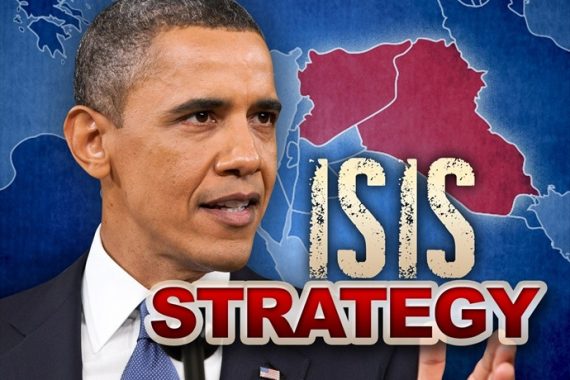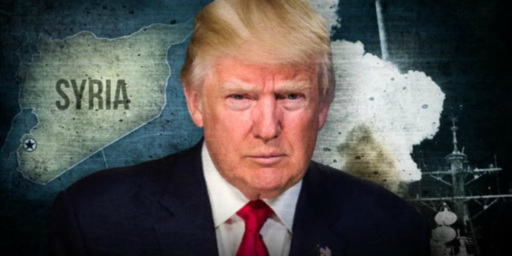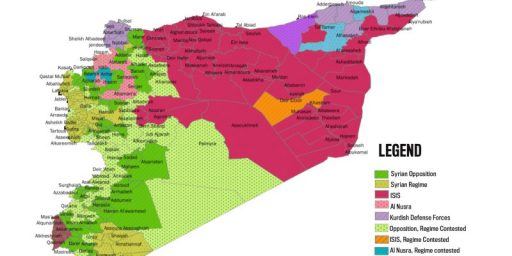America’s ‘Alliance’ Against ISIS Exists Mostly On Paper, Not In Reality
America's much touted international coalition against ISIS is, essentially a Coalition In Name Only.
The New York Times reports that the United States has quietly been losing allies in the fight against ISIS in Syria and Iraq:
AL UDEID AIR BASE, Qatar — As the United States prepares to intensify airstrikes against the Islamic State in Syria, the Arab allies who with great fanfare sent warplanes on the initial missions there a year ago have largely vanished from the campaign.
The Obama administration heralded the Arab air forces flying side by side with American fighter jets in the campaign’s early days as an important show of solidarity against the Islamic State, also known as ISIS or Daesh. Top commanders like Gen. Lloyd J. Austin III, who oversees operations in Syria and Iraq, still laud the Arab countries’ contributions to the fight. But as the United States enters a critical phase of the war in Syria, ordering Special Operations troops to support rebel forces and sending two dozen attack planes to Turkey, the air campaign has evolved into a largely American effort.
Administration officials had sought to avoid the appearance of another American-dominated war, even as most leaders in the Persian Gulf seem more preoccupied with supporting rebels fighting the government of President Bashar al-Assad of Syria. Now, some of those officials note with resignation, the Arab partners have quietly left the United States to run the bulk of the air war in Syria — not the first time Washington has found allies wanting.
Saudi Arabia and the United Arab Emirates have shifted most of their aircraft to their fight against Iranian-backed Houthi rebels in Yemen. Jordan, reacting to the grisly execution of one of its pilots by the Islamic State, and in a show of solidarity with the Saudis, has also diverted combat flights to Yemen. Jets from Bahrain last struck targets in Syria in February, coalition officials said. Qatar is flying patrols over Syria, but its role has been modest.
“They’ve all been busy doing other things, Yemen being the primary draw,” Lt. Gen. Charles Q. Brown Jr., who leads the air war from a $60 million command center at this sprawling base in Qatar, said of the Arab allies. He added that those allies still fly periodic missions in Syria and allow American jets to use their bases.
The United Arab Emirates last carried out strikes in Syria in March; Jordan in August; and Saudi Arabia in September, according to information provided by allied officials last week. But the Arab allies insist they are still playing an essential, if less active, military role in the war.
“Jordan’s commitment to this fight is unwavering,” said Dana Zureikat Daoud, a spokeswoman for the Jordanian Embassy in Washington. “We remain an active partner and contributor to the international coalition, and continue to conduct airstrikes against Daesh targets.”
The engagement of Western allies, like France and Australia, has also been limited. They have conducted a smattering of strikes in Syria, but have reserved most of their firepower for Islamic State targets in Iraq. Canada’s new prime minister, Justin Trudeau, has promised to fulfill his campaign pledge to end Ottawa’s role in the air campaign altogether. And none of the Western allies appear eager to join the United State in basing warplanes at Incirlik air base in Turkey, a move that would make it easier to increase strikes against militants in northern Syria and Iraq.
So far, eight Arab and Western allies have conducted about 5 percent of the 2,700 airstrikes in Syria, compared with 30 percent of the 5,100 strikes in Iraq, where many NATO partners also fly missions against the Islamic State. But the United States was always likely to fly the majority of the missions in Syria, as it does in Iraq, since its air forces are much larger than those of the Arab states or any forces deployed by Western allies.
The reluctance of American allies to get further involved also includes a reluctance to put their forces any closer to Syria and Iraq than they already are even though doing so would make strikes easier and cheaper:
Incirlik is far more convenient to the fight — 15 minutes flight time to the Syrian border compared with nearly five hours from Persian Gulf bases — making it easier to increase the number of planes that can spend more time hunting Islamic State targets. But Australia and most of the European allies are reluctant to leave their bases in the Middle East, despite the shorter flight times.
“It’s not just as simple as, ‘go to Turkey,’ ” Gen. John R. Allen, the special American envoy to the coalition fighting the Islamic State, told Congress last month. “They’ve got bilateral relationships in the gulf that are old, and have been cultivated in order for them to deploy.”
So while France will still conduct airstrikes in Syria — it has carried out about 270 strikes in Iraq and Syria over all, though only two so far in eastern Syria, a senior French official said — it will continue to fly out of Jordan and the United Arab Emirates, at least for now. The Australians will continue F/A-18 combat missions over Syria that began on Sept. 11, expanding beyond strikes in Iraq. But they, too, do not want to give up their base in the United Arab Emirates.
Britain has talked tough about going after the Islamic State, but unlike France, its actions have not matched its talk. Britain currently flies bombing missions over Iraq and intelligence, surveillance and reconnaissance flights over Syria.
The British defense and foreign secretaries have said they want forces to be able to fight the Islamic State in Syria as well as in Iraq, and that it is absurd to stop planes at a border that the militant group does not recognize, especially since its command centers are in Syria. But stung by Britain’s experiences in Iraq and Afghanistan in support of American wars, Prime Minister David Cameron has promised to seek the approval of Parliament before taking any military action in Syria. He has said that he will only press for such a vote if he has “a clear majority” in favor, and so far he has failed to find one.
On some level, of course, the fact that the United States is shouldering most of the burden in the fight against ISIS is neither surprising nor unusual. Even in past recent conflicts such as the Persian Gulf War, the War in Afghanistan, or even the Iraq War, where we were joined by allies whether it be a handful in Iraq or dozens in the Persian Gulf War, it was always the United States that was providing most of the men, material, and planning for military action. It’s also been true of NATO from the beginning of the alliance and was largely true of the Western Front in Europe and the Pacific Theater during World War II. This is what happens when one is the overwhelming military power on the planet and the most powerful member of the coalition. Nonetheless, when we start seeing members of a coalition drop off from even the minor level of participation that they had been engaging in it starts to call the entire endeavor into question. Yes, the small contributions that nations like Canada, Jordan, and the United Arab Emirates have been making to the effort can and will likely easily be made up by U.S. forces, but that’s not really the point. When the fight itself start shifting from being an international coalition in which the United States is the senior partner to one where it is basically just the United States, the political nature of the fight arguably changes. Having an international coalition, especially one that includes Arab and Muslim nations, helps lend a certain air of credibility to U.S. policy in the region. With that slipping away, the old propaganda arguments about American imperialism may suddenly start to resonate with civilians mostly concerned with surviving while bombs fall around them,
The interesting question going forward, of course, is what impact last weekend’s crash of a Russian passenger jet in the Sinai Peninsula, which U.S. intelligence said earlier this week was looking more and more likely as having been cause by a bomb may have on all of this. As things stand right now, there is not yet any definitive conclusion about what caused the plane to go down with the loss of all lives on board. Both The New York Times and CNN are reporting, though, that investigators are increasingly focusing on evidence that points to the probability of a bomb or other explosion having been the cause of the crash. Even the Russians, who had spent most of the past two days dismissing the reports about a bomb seem to be coming around on this point, as evidence by the announcement that all flights between Egypt and Russia had been suspended until further notice, apparently due to security concerns. If it is confirmed that the plane was brought down by a bomb, and that bomb can be linked to an ISIS-linked group in the Sinai, then it has the potential to change the game on the ground significantly. Notwithstanding whatever differences the United States and Russia may have about the future of Syria, for example, both nations have an obvious interest in international air security, as does pretty much every other nation that has been involved in some way in the U.S. coalition. The prospect that ISIS may now be able to get bombs on airplanes increases the risk they pose to the rest of the world significantly, and that may be enough to change the way that some of the nations that have sat on the sidelines so far approach the situation. For the time being at least, though, the fight against ISIS is pretty much just a U.S. effort and the coalition that the President has touted in the past basically just exists in name only.






American allies are main supporter of ISIS especially Saudi Arabia, Qatar and Turkey. How can they attack their terrorists brothers? . Western allies like France’s intetests are with Sunni World. They don’t want to angry Arabs.
Only Shia alliance can defeat to ISIS. IRAN, IRAQ, LEBANON, with the help of AISTRALIA,GERMANY, CAANADA and RUSSIA.
The US vs ISIS plus multiple proxy wars with Syria, Iran, and Russia. How could any of our allies possibly think that’s a bad idea?
You went through an entire long post on this, Doug-and didn’t mention the Kurds, who are doing the lion’s share of fighting ISIS both in Northern Iraq and in Syria. Maybe you might want to update your post-because the Kurds are a tough and committed ally who are more than holding their own.
@stonetools:
I didn’t mention the Kurds because that’s a slightly different issue. We’re mainly talking about Western and Arab allies here.
But, yea, the Kurds are playing a big role, and at some point it’s going to bring up a big question — Kurdish Independence. If they haven’t earned it at this point, I don’t know what it’s going to take for them to get it.
Of course, that’s going to raise interesting issues for the territorial integrity of Iraq and Syria, and the Turks aren’t going to be too thrilled either.
Once again, we can thank the Brits and the French and the borders they drew at the end of World War One for much of this.
@David: Okay, we have gone back and forth about ISIS. We have tried no action, limited action, controlled action, secret action, containment, etc. Everyone has grown tired of this group of brigands, cutthroats, and pirates. So the President should throw down the gauntlet and get a coalition together for a no playing around 100% wide open take no prisoners once and for all for old times sake full frontal assault: US, Iraqi, Russia, England, Israel, Turkey, France, Germany, and if China wants to throw in, they can come too (“you want a piece of this ?”). Iran – we will overlook their recent transgressions (see Iranian demonstrators burn US flag and President Obama in effigy: NBC news) and they can protect the flank with their camel brigade and Enfield rifles. Give ISIS ten hours to surrender lock, stock, and barrel man by man (“You can go home pig or pork, make your choice“ Dillon). Then it will be infantry, cavalry, artillery, air power, grenades, bazookas, mortars, flame throwers, sawed off shotguns, M82 Barretts, and anything else on the shelf. It should take about a week. All participants can keep what ever they find, from gold to fighter jets. “If you like your weapons, you can keep them”.
Mission over. “Mission accomplished”
If some of these countries don’t want to help out, don’t call the US when ISIS is marching through your capital.
This whole problem came about because there has been no coherent, consistent policy in the Middle East. It has been make it up as you go, day by day, reaction not pro-action.
That is my essay, but I did not have time to do much research this time.
“I’ve laid around and played around
This old town too long
Summer’s almost gone
Yea, winter’s coming on” (Neil Young)
I’m surprised we got that much out of them. The Arabs have never been good at western-style warfare. In fact, no one in the middle east has been worth much militarily since the great (Kurd) Saladin. These are corrupt, sclerotic monarchies that buy planes for prestige, as pay-off to their American protectors, and for use against their own people.
There’s a reason why eight million Israelis have managed to militarily over-awe 200 million Arabs. The Israeli military is a western force, educated, trained, disciplined, with a corps of NCO’s and junior officers willing to show initiative. Same reason we were able to brush aside the Iraqi military not once but twice.
So, frankly, good. We have state-of-the-art air power, a highly complex, co-ordinated mechanism that is about three generations and an industrial revolution away from the princelings and courtiers who fly planes for the KSA and UAE. Having these people flying alongside ours is like putting high school players on the field with the New England Patriots.
FWIW, the Federation of American Scientists has made available a Congressional Research Service report, Coalition Contributions to Countering the Islamic State, that tells congress critters who is doing what. Looks like most effort is in training Iraq’s army.
There is also, Armed Conflict in Syria: Overview and U.S. Response, from the CRS, the tl;dr version, everybody in Syria wants to take a poke at each other, will continue to do so if Assad goes and nobody has a clear idea of what to do.
@Tyrell:
Yeah! And then we’ll all be like “PEW PEW!” and ISIS will be all “Whoaaa Ai-yai-yaaiiii” and they’ll probably drop their guns and try to run really fast but WE will be all “HI HO SILVER GIDDYAP!” And we’ll chase down those no goodnicks and give them a true what-for with all the might of Uncle Sam riding on a John Deere F-16 navigated by an Alaskan grizzly bear chugging an Ol’ Milwaukee.
The ineffectiveness of the Administration’s strategy is its redeeming feature. If it were more effective, we’d be supplying radical Islamists faster and more efficiently. We’re on the wrong side in the conflict or, more precisely, there are no good guys there and there is no right side.
The only way to win is not to play.
@Dave Schuler:
Not in this case. If we can stop ISIS from spreading or consolidating its position, that’s worth doing. Especially since we are in fact doing it and at minimal cost. By not playing we’d be allowing one faction (probably ISIS) to become a serious force on the ground and to threaten our interests much more effectively.
The strategy re: ISIS is clear, Dave: We are containing ISIS. That’s been the idea from the start, it’s what we’re doing, it’s more or less working. The fecklessness of our allies and the intervention of the Russians has not changed that. Jordan appears solid for now, ISIS has not been able to hit Saudi Arabia, they are not endangering Israel. That’s what we wanted, that’s we’ve got.
The alternative of walking away is attractive (attracts me sometimes) but drastic and dangerous.
If that’s the strategy, Michael, it’s failing. DAESH controls more territory now than it did in 2014 and controlled more territory in 2014 than in 2013.
We can mitigate our risks in the Middle East. It’s a lot harder for our notional allies in Europe to do so. But those are their risks not ours and if they’re not willing to pay for their own defense it’s hard for me to justify our doing so.
The Russians have flown more sorties in Syria in three months than we have in 15 months. There are two reasons for that. They’re getting much better intelligence on the ground than we ever have and they have a clearer mission, unimpeded by attempting to separate good rebels from bad rebels. With Syria Army, Iranian, and Hezbollah ground troops (and Cuban!), they’re likely to be able to consolidate the Alawite regime’s position in northern Syria, pushing the rebels back. Right now our best course of action is staying out of the way.
Things are heating up. In the last few days, Ash Carter has been warning Russia and China.
Yesterday, a mysterious missile test was conducted, lighting up the skies over parts of California.
Many residents said this was no ordinary missile.
@Dave Schuler:
What ISIS controls is mostly a big bunch of empty desert. They are not in Baghdad, they are not in Amman, they are not in Riyadh, and a year ago those were all very real possibilities. They’ve been pushed off the Turkish border.
The number of sorties is irrelevant per se. What matters is their effect. But, so what? So now we’re hitting ISIS and so is Russia? Ok. I’m fine with that.
The fact is that when we got into this with ISIS it looked like they might roll right across the region, and they have not. They have in fact been contained.
@michael reynolds: Russia is designating targets in pursuance of specific goals and a larger strategy. They’ve conducted more sorties in their first two weeks than we had in the previous year, because we don’t know what to bomb. We have no strategy, no goals as a metric of effectiveness in pursuing a strategy and no idea of what constitutes victory; the sole reason for our current involvement is to present the illusion of American leadership, something Washington seems to think of the utmost importance.